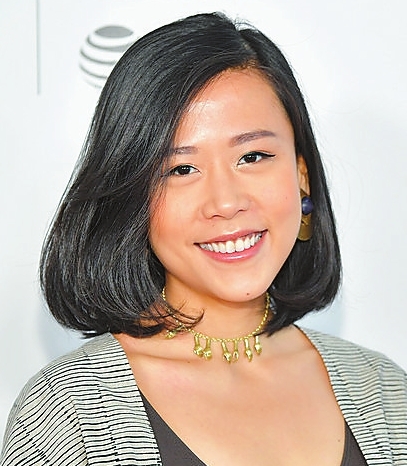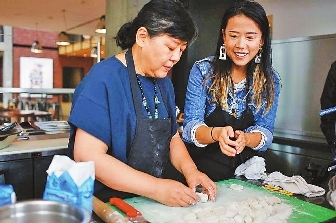

THE animated film “Bao” made hearts melt in June 2018 when it premiered ahead of “Incredibles 2,” and scored an Academy Award earlier this week for “Best Animated Short.” The director, Domee Shi, has made history being the first woman to direct a Pixar short. She is also only the fourth Asian animation director ever to win an Oscar, and the first Asian woman to do so. “To all the nerdy girls out there, who hide behind their sketch books, don’t be afraid to tell your stories to the world!” Shi said as she accepted the Oscar. The eight-minute “Bao” centers on a Chinese mother with a case of empty nest syndrome. She gets a second chance at motherhood when one of the dumplings she made comes to life as a tiny, giggly baby. The Chinese-Canadian filmmaker took inspiration from her own life as a child of immigrants when crafting the short, a story Shi first started working on over five years ago. “I was digging through my art folder at work and the earliest sketch I found was dated January 2014,” said Shi. “It was just a bunch of different dumpling ideas, different dumpling characters.” Shi had worked on “Bao” for almost two years on her own before bringing on more people. Shi also served as a story artist on “Inside Out,” “The Good Dinosaur,” “Toy Story 4” and the film her short was paired with, “Incredibles 2.” Born in Chongqing in 1989, Shi moved to Toronto from China with her family when she was 2, according to The Disney Blog. Her father was a college professor for fine arts and a landscape painter in China. She grew up in the North York area, and during her childhood, she watched lots of Studio Ghibli and Disney films. After completing Sheridan College’s well-regarded animation program, Shi went on to intern at Pixar Animation Studios in California. Shi was hired on after her internship and her first film credit was for the hit animated film “Inside Out.” The animator, who now lives in Oakland, California, drew on her relationship with her mom as inspiration for the short. “I was mainly inspired by my own life as an only child to two Chinese parents, but especially my mom. She’s always been overprotective of me, coddling me, smothering me like a precious little dumpling,” she said. “So I decided to tell the story through her point of view, and I think by doing that I understand her more. I think I now understand the idea of loving something and letting it go.” She explained that depending on how you pronounce it, “bao” can mean “steamed bun” or “something precious” in Chinese. Shi’s mom also took part in the production of the film, serving as a cultural consultant and providing detailed demonstrations of how to make perfect dumplings, which were filmed and used as reference. Shi called her mother a “dumpling master.” “I thought food was a great metaphor and vessel to tell this story of a mother and her love for her child,” Shi said. “Chinese immigrant parents won’t say, ‘I love you,’ or ‘I’m proud of you’ to a kid, but they’ll say, ‘Are you hungry? Have you eaten?’ I wanted to use food as that language, that expression of love.” Shi said to her parents, her winning an Oscar was like their immigrant dreams have been realized in her, though they’ve also stayed true to their nature. Her father told her he loved “Bao” but also wanted to share some notes with her on the colors it used. Her mom congratulated her but reminded her to be humble and be respectful to her seniors at work. “And I was like, ‘Thanks, mom, for that advice I didn’t ask for,’” she said. Shi said she felt really excited and honored to be the first woman to direct a Pixar short, but also felt that pressure of being the first. She’s currently in pre-production on a Pixar feature, writing the story, and waiting for it to be greenlit, but just the fact that she was asked to direct a Pixar feature — something only one other woman has done at the studio — is beyond thrilling, Shi said. “Drawing has been a passion of mine forever and I knew, even when I was little, that I wanted to draw for a living,” Shi said. Shi even considered exploring medical illustration because her parents wanted her to be a doctor, but it didn’t work out. “It’s kind of cheesy but my biggest weakness in life ended up helping create my superpower,” She said. “I’ve always been shy and introverted, and when I was in middle school I had a stutter which caused me to not say anything at all in a room. So I turned to drawing and I found that I didn’t have to say anything, but I could still communicate what I wanted through drawing. I worked hard at honing those really basic technical drawing skills. My dad’s a painter, an artist, himself, so he really helped me with that, too. We would go to life drawing classes together.” When interning at Pixar, Shi found she had to pitch her ideas in front of a large room of people. “It was terrifying at first. But I got here and I made a name for myself with my drawing abilities, and my ideas,” she said. “Being that immigrant kid caught between two worlds, it turned into an advantage. Being at the center of these different cultures, I grabbed things that I liked from each of them and that helped me form my voice, my point of view, and my sense of humor, too.” For research on different kinds of dumplings, Shi took the crew on multiple trips to San Francisco and Oakland’s Chinatown. “We took them to a lot of dim sum restaurants. And also Sichuan food restaurants because there are a lot of dishes in the short that the mom character makes that are actually inspired by my favorite dishes that my parents would make for me growing up,” she said. “We also brought my mom in twice to do dumpling-making classes for the whole crew. That was really fun research because we actually filmed her hands kneading the dough and making the wrappers, and that was used as reference for the opening shots of the short.” One of the reasons Shi became a filmmaker, she said, is that she loves using film and stories to step outside of her own point of view and her own perspective. “It was really interesting to tell this story from the mother’s point of view because I never knew what it was like on the other side,” she said. “I was always so frustrated about being so coddled and overprotected and smothered by my mom. I never really understood why she did it.” Shi talked to her mom, and talked to different parents and kids of overprotective parents throughout the process to gain a better understanding. For including Chinese cultural details in “Bao,” Shi invited Chinese-American production designer Rona Liu to join her. “We based a lot of the household on her mom’s house and my mom’s house,” she said. “Like the toilet paper roll on the coffee table. We got a lot of questions from our non-Asian crew members like ‘why is there toilet paper on the coffee table?’ We told them it is important because in a lot of Chinese immigrant families it’s just more practical to buy tons of toilet paper so you don’t have to buy two types of tissue paper: Kleenex and toilet paper.” “Also the little details like the soy sauce bottles and the hot sauce jars and stuff on the table. Those little details that made this setting in the short feel like a real Chinese mom’s home,” she said. Shi and her crew decided early on not to have dialogue in the short because they wanted to push themselves to tell this story in a purely visual way and make it as universally understood as possible. Towards the ending of “Bao,” the mom ate the dumpling child, which many say is dark. “It also came from my own life. My mom would often hold me close and say, ‘Oh I wish I could put you back in my stomach so I knew exactly where you were at all times,’” Shi said. “I was like, ‘Mom, that’s sweet. But creepy.’ And I wanted to explore that. The mom character immediately regrets it, as I think we all would if we did that. But I wanted to tap into that feeling. That primal feeling of just wanting to love something so much that you’re willing to destroy it so it won’t go away.” Shi admitted that she was worried that the ending would be too dark or too shocking for a Pixar film at first. So she pitched it to Pete Doctor, the director of “Inside Out,” who’s been her mentor figure and the executive producer for “Bao.” Doctor encouraged her to stay true to her weird, original idea. “I think through his support, saying ‘Don’t be afraid to push it, be as culturally specific as you want it to be,’ it really gave me the confidence,” she said.(SD-Agencies) | 
